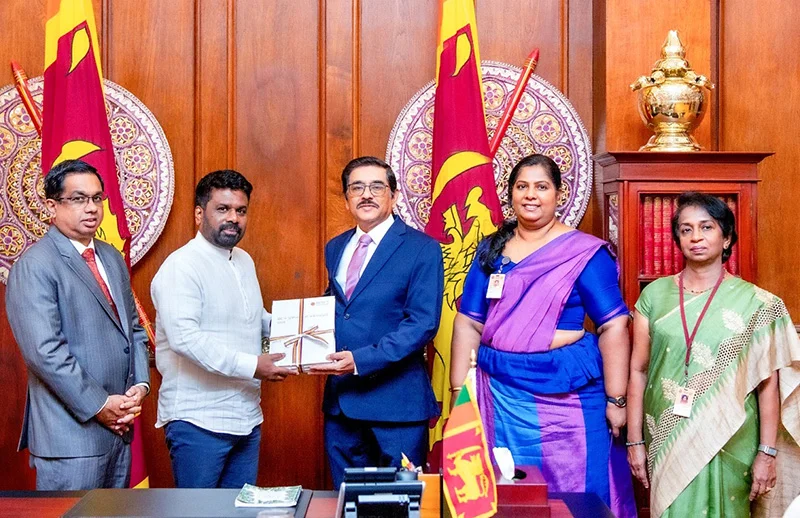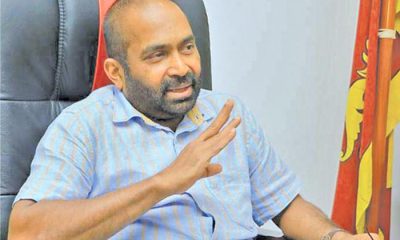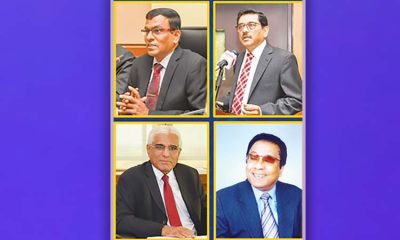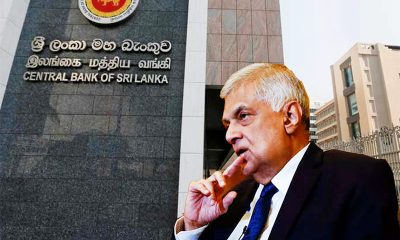Business
Current ‘discourse’ on CBSL salary revisions ‘extremely partial and based on personal agendas’

We, the Central Bank Executive Officers’ Union (CBEOU), as a professional union representing the Executive Officers of the Central Bank of Sri Lanka, wish to clarify some facts, as it was evident that the discourse on the recent salary revision of the Central Bank of Sri Lanka is extremely partial and raised without proper knowledge of the facts and / or based on mere personal agendas, the CBEOU said in a press release.
The release signed by the Union’s General Secretary M.N.P. Jayaweera and president, D.J. Perera, explains: ‘Central Bank of Sri Lanka was established as an independent institution since its inception. Accordingly, the previous Monetary Boards as well as the current Governing Board have been assigned the decision-making independence related to administration on a logical basis and that administrative independence remains the same for other central banks around the world.
‘Accordingly, since the inception, the Monetary Board decided the recruitment procedures, professional training and salaries related to the Central Bank service. It should also be mentioned that neither the previous Monetary Boards or the present Governing Board include the employees of the Central Bank, and that the members of the Governing Board are scholars and professionals in a variety of fields of the country. Considering the corporate governance practices, salary revisions have been done in every three years in the Central Bank of Sri Lanka for several decades as similar to certain state sector establishments.
‘The 2024-2026 collective agreement is an agreement reached by all parties after several rounds of bargaining between all the unions and the Governing Board of the Bank. Accordingly, all parties are bound to work under the terms of the collective agreement for the next three years.
‘It is no secret to society that salaries in the Central Bank of Sri Lanka are at an elevated level compared to other government services. Also, the Central Bank of Sri Lanka, which is the apex financial institution in the financial system that supervises licensed banks and registered non-bank financial institutions, must be compensated competitively in line with the institutions they supervise, in order to discharge their duties without influence. Due to this situation, the educated youth community of this country is eager to leave jobs in the government as well as private sector to join the Central Bank service. Students with a First or Second Upper-Class degree in a limited range of subjects are recruited to the Central Bank staff class after passing a highly competitive examination and interview(s). It is also a known fact that the passing percentage is exceptionally low for this entry examination.
‘Furthermore, unlike other government employees, there are many other limiting factors including legal barriers that make it impossible for the Central Bank professionals to use their professional qualifications to set up private practice. Since, the Central Bank is not a commercial institution and is a closed service, the promotion opportunities available to Central Bank employees are rather limited.
‘It is a generally accepted opinion that if there are limiting factors related to a service, a specific payment (compensation) should also be made related to that service. Further, the salary of a particular job is determined based on the responsibilities pertaining to its delivery, the qualifications to be met and the demand/supply for the job in the labor market. Based on the knowledge and practice of central bankers, their potential job market will be the financial sector or monetary policy making within or outside the country. In the past year alone, the Central Bank of Sri Lanka has lost nearly a hundred officers of its wealth of human capital, and the fact that some have joined international organizations including the World Bank and its affiliates, Bank of England, and the Commonwealth Secretariat, etc. is a confirmation of such movements.
‘If this salary revision did not take place, a considerable number of the remaining officers would have left the Central Bank of Sri Lanka as well as the country and the Bank’s activities could have been severely disrupted. It is such a pity that the ongoing criticisms utterly disregard this reality. It is not clear why those who raised their voice over the possible brain drain in the past are raising their voice against the measures taken to prevent it from happening.
‘Moreover, in a backdrop of no revision of pensions, the fact that the pensions of Central Bank pensioners have been increased by about 70% is a complete fallacy, and it is apparent that such news was purposely planted in the society to tarnish the image of the Central Bank of Sri Lanka in the face of personal agendas of certain parties.
‘For the progression of a society, existence of rational discourse is beneficial, but we can clearly observe the political and personal agendas operating under the guise of the one-sided dialogue in the society at present. In view of the inflation and existing tax burden in the country, private institutions including some private banks have taken various measures to avoid the inconvenience caused to their employees, and it is the opinion of our union that salaries should be revised in other sectors including government institutions.
‘Even though it has been proclaimed through a Supreme Court decision as to who holds responsibility for the country’s economic crisis, basis for accusing the Central Bank officials as “economic hit men”, should be explained by the so-called politicians before the society. Similarly, if there are (or were) such officers, there is no impediment in taking appropriate disciplinary actions against such individuals through an independent investigation and such an independent investigation process will definitely receive the fullest support of our professional Union.’
Business
Colombo Tea Auction: BOP struggles while lower-grade teas gain

Analysts see budget-conscious international buying amid global economic pressures
This week’s Sri Lanka tea auction recorded the highest volume since February, with total offerings reaching 6.45 million kilograms (M/Kgs). However, the market displayed a mixed performance, with high-quality Broken Orange Pekoe (BOP) varieties facing price declines while lower-end teas saw appreciation.
Select Western BOP/BOPF teas, typically among the most sought-after, dropped by over Rs. 100 per kg, while others in the category saw smaller declines. Nuwara Eliya BOPs, known for their delicate flavor were mostly unsold, and when sold, fetched up to Rs. 200 per kg less than previous levels. Uva BOPs also declined by up to Rs. 50 per kg, reflecting weaker demand for premium liquoring teas.
In contrast, teas at the lower end of the market fared better. Below Best BOPs remained steady, while BOPFs in the same category fell by Rs. 50 per kg or more, influenced by inconsistent quality. Meanwhile, Low Grown PF1s (CTC grade) saw a firmer trend, with some appreciation in value.
The Leafy and Semi-Leafy sector saw Select Best BOP1s maintain stable prices, while OP1s (Orange Pekoe) were irregular—well-made varieties eased, but others appreciated. In the Tippy segment, high-priced FBOPs dipped, but Best and Below Best grades held firm, with the lowest-end teas gaining value.
Despite price corrections, all categories met fair demand, with Low Growns dominating at 2.6 M/Kgs. The Premium catalogue showed selective firmness for very tippy teas, while others eased or declined.
Analysts suggest that the dip in high-quality teas may reflect subdued demand from key export markets, while the resilience of lower-grade teas indicates steady domestic and budget-conscious international buying.
“With global economic pressures persisting, auction trends may continue fluctuating in the coming weeks,” they said.
– Reported using data from Forbes & Walker Tea Brokers
By Sanath Nanayakkare
Business
CBSL releases publication on financial statements for 2024

The publication on the Financial Statements and Operations of the Central Bank of Sri Lanka 2024, a requirement under Section 99(2) of the Central Bank of Sri Lanka Act, No 16 of 2023, was presented to the President and the Minister of Finance, Planning and Economic Development, Anura Kumara Dissanayake, by Dr. Nandalal Weerasinghe, the Governor of the Central Bank of Sri Lanka, 29 April.
Dr. N S Kumanayake, Secretary to the President, Ms. Lasanthi Sirimanne, Chief Accountant and Ms. Samudra Jayasundera, Director Policy Review and Monitoring Department of the Central Bank were also present at this occasion.
The Financial Statements and Operations of the Central Bank of Sri Lanka 2024 present an overview of the Central Bank’s institutional performance during the year 2024. The publication is structured into three main components: Operational Insights, Financial Statements, and Supplementary Information.
The Operational Insights section outlines the Central Bank’s strategy and its core responsibilities, including maintaining domestic price stability, ensuring financial system stability, overseeing payment and settlement systems, managing currency issuance, and strategic communication. This section also covers the Bank’s international engagements, the execution of other entrusted responsibilities including agency functions, and internal management arrangements.
The Financial Statements section presents the IFRS-compliant financial statements of the Central Bank of Sri Lanka for the year ended 31 December 2024, along with the independent report of the Auditor General. This segment also includes a financial review, providing an analysis of the Bank’s financial performance during the year.
The Supplementary Information section provides details on the Bank’s regional presence, the list of institutions regulated and supervised by the Central Bank, and a summary of corporate information.
The interactive PDF of this publication can be accessed through; https://www.cbsl.gov.lk/en/publications/economic-and-financial-reports/financial-statements-operations
Business
Emirates deepens strategic partnership with Sri Lanka Tourism Promotion Bureau to support local travel industry

At the Arabian Travel Market 2025, Emirates and the Sri Lanka Tourism Promotion Bureau (SLTPB) have renewed their partnership aimed at further developing the country’s tourism and trade industries. The partnership was sealed through a Memorandum of Understanding (MoU) between the two parties.
The MoU was signed by Essa Sulaiman Ahmad, Emirates’ Senior Vice President of Commercial West Asia & Indian Ocean and Sampath Nissanka, Managing Director – Sri Lanka Tourism Promotion Bureau. The signing ceremony was also attended by Adnan Kazim, Emirates’ Deputy President and Chief Commercial Officer; Alexi Gunasekera, Consul General-designate of Sri Lanka to Dubai and the Northern Emirates in addition to other representatives of the airline and tourism board.
First inked in 2022, the renewed MoU will strengthen the collaboration between Emirates and SLTPB, with both the airline and tourism body reiterating their commitment to actively promote Sri Lanka as a destination to key markets within Emirates’ network.
Through joint initiatives, such as developing excursions and familiarization trips to promote the island nation to key feeder markets, Emirates and SLTPB aim to grow the tourism industry of the popular Indian Ocean destination by showcasing the destination to customers across the airline’s global network.
The joint efforts to boost the nation’s tourist industry have supported a steady increase in inbound traffic into the island, which recorded just over 2 million visitors in 2024. Between April 2024 and March 2025, Emirates carried over 240,000 passengers into Sri Lanka from key markets around its network including Russia, the UK, Germany, Australia, China, and the US, among others.
-

 Business4 days ago
Business4 days agoPick My Pet wins Best Pet Boarding and Grooming Facilitator award
-

 News4 days ago
News4 days agoNew Lankan HC to Australia assumes duties
-

 News4 days ago
News4 days agoLankan ‘snow-white’ monkeys become a magnet for tourists
-

 News2 days ago
News2 days agoJapan-funded anti-corruption project launched again
-

 Features4 days ago
Features4 days agoKing Donald and the executive presidency
-

 Business4 days ago
Business4 days agoACHE Honoured as best institute for American-standard education
-

 Features6 days ago
Features6 days agoThe Truth will set us free – I
-

 Business2 days ago
Business2 days agoNational Savings Bank appoints Ajith Akmeemana,Chief Financial Officer
























